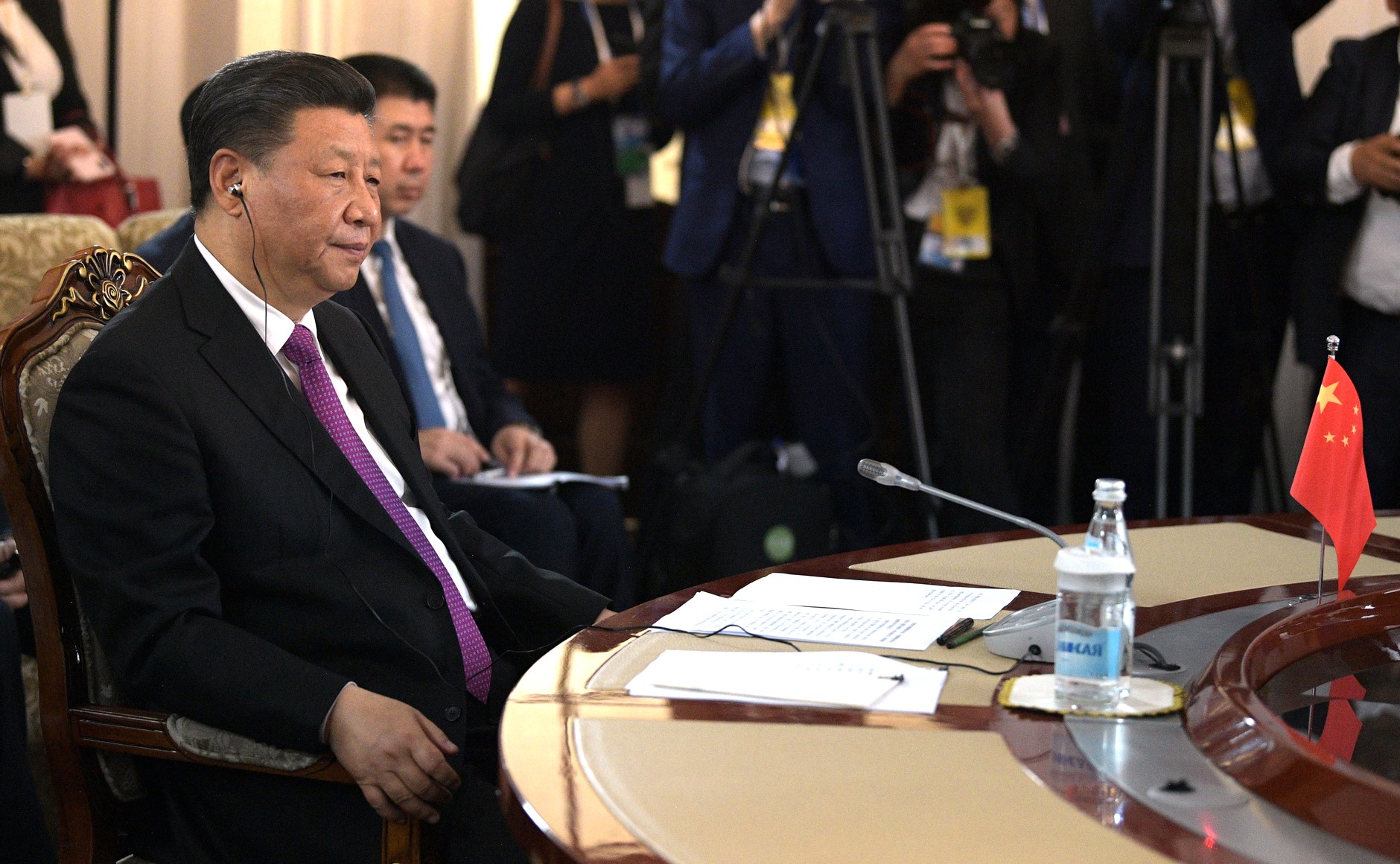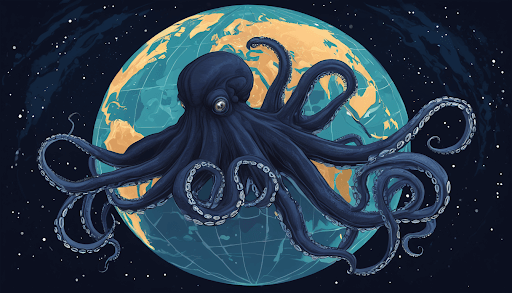Beijing Turns to Public Diplomacy and Messaging Campaigns, as the Coronavirus Spreads Worldwide
Lawfare's biweekly roundup of U.S.-China technology policy news.

Published by The Lawfare Institute
in Cooperation With

The novel coronavirus has now spread to countries around the globe and infected more than 500,000 people, sending shockwaves through the global economy and severely straining health care systems worldwide. The virus is spreading rapidly in the United States, Europe and other parts of the world. But China—where the virus originated months ago—appears to have curbed viral spread through aggressive lockdown measures and extensive testing. Experts remain uncertain about whether Beijing has defeated the virus: Some observers worry that, as the country returns to work and the virus expands globally, community transmission may resume. But at the moment, President Xi Jinping finds himself in an unusual position: As the rest of the world struggles to cope, China has emerged as perhaps the only country with the resources and political will to help. Beijing has launched campaigns to provide aid and experts to other nations. These moves, however, come as Beijing has ratcheted up its public messaging to deflect blame for its early mishandling of the coronavirus outbreak—a failure that many believe allowed the outbreak to become a pandemic.
In recent weeks, China has donated or sold medical equipment to more than 20 countries. It has provided ventilators and other supplies to Italy, given protective equipment to Liberia, furnished testing kits to the Philippines, given masks to the Czech Republic, and sent medical teams to Iraq. China has also donated $20 million to the World Health Organization (WHO) to help fight the virus. A foundation funded by Jack Ma—the co-founder of the Alibaba Group and the wealthiest person in China—has also donated masks and testing kits to the United States, to 24 Latin American countries, and to other nations.
China’s efforts to support countries around the world may have lasting implications for international relations. In a telling example, Serbian President Aleksandar Vucic criticized the European Union for failing to provide aid to Serbia, while praising China for its rapid assistance: “I believe in my brother and friend Xi Jinping and I believe in China’s help,” he said. “European Solidarity,” Vucic said, turned out to be nothing more than a fairytale. Analysts say that Serbia, a candidate to join the European Union, finds itself at a crossroads between the West, on the one hand, and China and Russia, on the other. And analysts speculate that China’s aid in a moment of crisis may pull Serbia further away from the West.
China has also launched a public messaging campaign to shift blame, after early missteps from the government in handling the outbreak. These errors included blocking access to news about the coronavirus and waiting too long to act, missteps that allowed the virus to spread quickly. As part of this new messaging effort, Chinese diplomats have aired unsubstantiated conspiracy theories to cast doubt on whether the virus actually started in China. The Chinese ambassador to South Africa wrote on Twitter that “[a]lthough the epidemic first broke out in China, it did not necessarily mean that the virus is originated from China, let alone ‘made in China.’” Some officials have gone further. Expanding on that same trope, Zhao Lijian, a spokesperson for China’s Ministry of Foreign Affairs, has even suggested that the virus was perhaps created by the American military before spreading to China. Chinese state media have pushed similar stories, all of which lack a scientific basis, questioning whether the virus came from the United States. The Global Times, a Chinese Communist Party (CCP) mouthpiece, wrote that “the Chinese public shared the suspicion raised by Zhao that the US might be the source of the virus and that the US is subject to questioning and is obliged to explain to the world[.]” But later, Chinese Ambassador to the United States Cui Tiankai sought to distance Beijing from the comments, saying it would be “crazy” to believe the U.S. military was responsible for the virus. A recent ProPublica investigation has also found that the Chinese government has deployed an army of Twitter accounts—some hijacked, some that make use of false identities—to support CCP messaging on the virus.
As the CCP has continued to attack the United States for its handling of the virus, President Trump and top U.S. Cabinet officials have responded in kind. Despite WHO guidelines to the contrary, Trump has continued to refer to the coronavirus as the “Chinese Virus,” which some analysts believe may be contributing to racism against Asians and Asian Americans. Secretary of State Mike Pompeo recently accused China of distorting vital health data, which “creates risk to people all around the world.”
Analysts have said that the escalating rhetorical battle stands in the way of cooperation between Washington and Beijing that could be central during an international crisis—a time when rhetorical jabs would typically be forgone in the interest of saving lives. In a relationship that has grown tense over long-standing trade disputes and other geopolitical questions, some analysts note that this blame game during a global pandemic may represent a new low.
In an “Echo of the Cold War,” China Expels 13 U.S. Journalists
In its largest expulsion of journalists in decades, China on March 17 revoked the credentials of at least 13 American journalists working for the New York Times, the Wall Street Journal and the Washington Post. Specifically, the Chinese government ordered that American journalists at these papers can no longer work in China—including in Hong Kong and Macau—if their press credentials were set to expire in 2020. The order affects nearly all U.S. nationals in the three papers’ respective Chinese offices, and it gave reporters 10 days to return their media passes. The three papers, in response, published on March 24 an open letter to the Chinese government urging it to cancel the order. In its March 17 announcement, Beijing also stated that the three news organizations, along with Time magazine and broadcaster Voice of America, must disclose more information about their Chinese staff, finances, operations and property.
China’s March 17 actions are the latest in a series of crackdowns in the U.S. and China against the other country’s journalists, though the latest Chinese measures have been by far the most aggressive. Last month, China expelled three Wall Street Journal journalists—two American and one Australian—after a Journal op-ed labeled China the “real sick man of Asia.” On March 2 the U.S. capped at 100 the total number of Chinese citizens who can work within the U.S. for a group of five Chinese state-owned media firms. While the State Department denies that this new policy serves to expel journalists, it could force up to 60 Chinese reporters from the country.
Many observers see the March 17 expulsions as signifying a low point in the U.S.-China relationship of recent years. The New York Times editorial board called China’s crackdown on journalists an “echo of the Cold War.” Others have said that the expulsions accompany the rockiest period in U.S.-China relations since the 1989 Tiananmen Square protests. And nearly all describe China’s March 17 actions as unprecedented. According to one Chinese journalism professor, they are unlike anything undertaken by the regime in the past 40 years. Before this incident, China had not expelled foreign reporters since 1998, and it has never expelled a group this size in the post-Mao era.
Western commentators have sharply rebuked the March 17 expulsions. Many portray them as an “attack on freedom of the press,” while others emphasize that the expulsions come just as the coronavirus pandemic increases the need for reliable information. Some have also called China’s “clearing out” of the three U.S. newspapers disproportionately harsh, since even under the new U.S. regulation, China’s state-owned U.S. outlets will still be able function effectively.
Top U.S. officials have generally condemned the expulsions. President Trump said on March 18 that he is “not happy” about the incident. Secretary of State Mike Pompeo likewise criticized the expulsion, expressing “regret” over China’s “unfortunate” decision. However, it is not yet clear what policy steps, if any, the Trump administration will take in direct response to the expulsions. Chinese officials, meanwhile, have cited the expulsions as essential to combat what they decry as “ideological bias” in U.S. reporting. One Chinese spokesperson defended the government’s actions by suggesting U.S. reporters “proceed from ideological prejudice” and “suppress the Chinese media unreasonably.”
China has long censored speech for political purposes, with the government policing content in forums ranging from newspapers to social media platforms. But China’s censorship has intensified during the coronavirus pandemic—a trend reinforced by the latest crackdown on U.S. newspapers. Chinese officials appear to have also stepped up interrogations of those expressing discontent with Beijing’s coronavirus response. Other reports suggest Beijing may have disappeared two citizen reporters documenting conditions in Wuhan, the center of China’s coronavirus epidemic.
Other News
On March 12, Trump signed into law the Secure and Trusted Communications Networks Act. The law tasks the Federal Communications Commission (FCC) with reimbursing rural telecom providers if they elect to replace parts of their network made by companies the U.S. deems “untrusted suppliers”—notably Huawei and ZTE. The law also bans telecom providers from using federal funds to buy these companies’ goods and services. The ban does not depart significantly from existing federal practice. Back in November 2019, the FCC voted to block U.S. telecom providers from using federal funds to purchase these companies’ components. It also drafted a framework for compensating affected U.S. companies. Still, the law highlights and reinforces Washington’s rising suspicion toward Chinese telecom giants and U.S. lawmakers’ concerns over espionage. In February, the FCC began surveying U.S. telecom providers about the effects—including the economic costs—of its November regulation.
TikTok, the video-sharing platform owned by Chinese firm ByteDance, announced on March 18 that it had formed a content advisory council to shape its U.S. content moderation policies. The council consists of seven inaugural members—including experts in law, policy, computer science and psychiatry. This move follows other recent steps TikTok has taken to adjust its content moderation policies—and its strategies for communicating its policies—to the U.S. regulatory landscape. In October 2019, TikTok recruited an American legal team, including two former members of Congress, to help craft its approach to content moderation. TikTok takes these steps as U.S. government concerns over TikTok’s user-data security and censorship continue to grow. This month, leaked TikTok policy documents amplified these fears: The documents indicate that TikTok uses a range of censorship tools, including removing content and banning users, to stifle political dissent against the Chinese government on its platform. TikTok is already under an administrative national-security investigation by the Committee on Foreign Investment in the United States (CFIUS). The CFIUS investigation centers on a 2015 acquisition of video platform Musical.ly by ByteDance, TikTok’s parent company. The Senate has also introduced a bill to ban TikTok apps from government devices, and branches of the U.S. military have ordered personnel to delete the apps from their smartphones.
China this month eased regulations covering online telemedicine platforms in response to the coronavirus outbreak. The move suggests that internet-based medicine platforms may play a greater role in Chinese health care going forward. At the beginning of March, China’s National Health Commission (NHC) issued an opinion stating that medical insurance would reimburse the costs of online prescriptions and consultations from medical institutions that meet regulatory requirements. Citizens will be responsible only for out-of-pocket costs for online medical transactions—just like citizens who elect to visit a physical hospital. In recent weeks, major Chinese online medicine providers, such as JD Health and Ali Health, have reported large spikes in medical consultations, website visits and user registrations. Chinese leaders began paving the way for the industry’s growth in 2018. That year, the NHC put forth regulations that recognized the legitimacy of online physician-patient diagnoses (as opposed to physician-physician consultations about patient diagnoses, which previous regulations covered). A 2019 speech by Premier Li Keqiang that mentioned online medicine further encouraged medical institutions to participate, and invest, in the practice.
Commentary
For the New York Times, Ian Johnson contends that Europe and the United States squandered an opportunity to mitigate the impact of the coronavirus by failing to act during the weeks when the virus first emerged in China. In the Wall Street Journal, Alessandra Bocchi argues that while Beijing’s aid to Italy during the outbreak has saved lives, the world must not lose sight of the CCP’s mistakes in Wuhan during the crucial early stages of the pandemic. For the Center for Strategic and International Studies, John Holden explains that in the wake of the coronavirus outbreak, rhetoric from Beijing and Washington cannot stand in the way of cooperation that could save lives on both sides of the Pacific. For CNN, Jill Filipovic says that President Trump’s decision to call the coronavirus the “Chinese Virus” serves to spur racism while distracting from his administration’s failure to control the pandemic. For Foreign Affairs, Kurt Campbell and Rush Doshi argue that the United States should step up to coordinate a global response to the crisis by working with China and investing in finding a cure to the virus, rather than engaging in tit-for-tat rhetoric. For Brookings, Ryan Hass argues that China and the United States should use their own history of working together in international crises—including during the Ebola epidemic and the 2008 financial crisis—as templates for cooperation during the coronavirus pandemic.
For MERICS, Noah Barkin argues that in light of U.S. export controls on technology—a policy targeted at China—European nations should form new governance structures designed to assess risks at the intersection of trade, security and technology. The Washington Post editorial board says that Western companies must end their ties to Uighur forced labor in China. In the Guardian, Richard McGregor argues that China’s recent decision to expel correspondents from America’s most influential news outlets is much more than a tit-for-tat: It reflects Beijing’s growing confidence in its own might and capacity to shape opinion around the world.
For Lawfare, Justin Sherman argues that the United States must do more to set norms for privacy and data collection in cyberspace, or else risk allowing China’s digital authoritarianism to become a model for countries around the globe. Karman Lucero explains how China has further tightened its grip on information flows in the wake of the coronavirus outbreak. In the Cyberlaw podcast, host Stewart Baker and guests discuss, among other topics, the ways China’s economy is now reinforcing its security ambitions, the new legal and technical ground broken by the United States in identifying two Chinese nationals who allegedly laundered $100 million on behalf of North Korean hackers, and a recent report from a Chinese cybersecurity firm alleging that American intelligence agencies attacked Chinese commercial servers.






